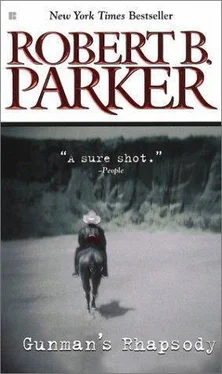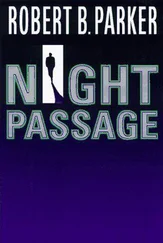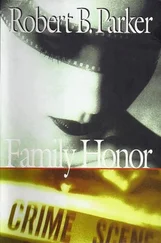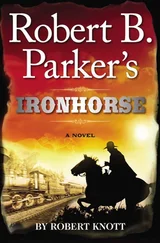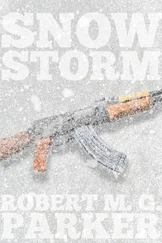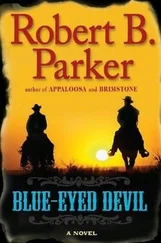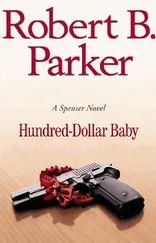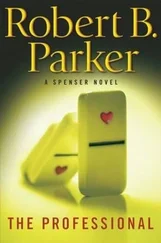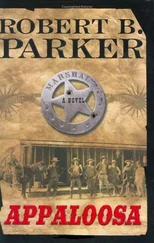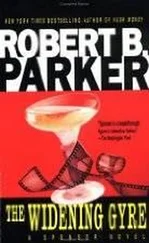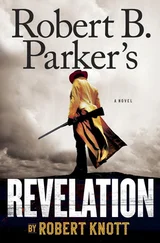
Robert B. Parker
Gunman's Rhapsody
Joan: So many towers, so little time
Was this the face that launched a thousand ships
And burned the topless towers of Ilium? Helen, make me immortal with a kiss…
MARLOWE, Faust
He already had a history by the time he first saw her, a reputation made in Kansas. He was already a figure of the dime novels, and he already half believed in the myth of the gunman that he was creating even as it created him. He wasn’t merely Virgil’s brother. He was the man who stood down Clay Allison in Dodge City.
He’d come to Dodge by way of Ellsworth and Wichita from the buffalo camps where every day he shot two buffalo a minute with a breechloading.52-caliber Sharps rifle. Set the shooting stick, rest the Sharps, aim at one, almost any one, among the vast flood of ill-contrived animals and fire. The herd paid no attention to the down animal or to the gunshot. Fire again. Litter the Kansas prairie with the carcasses of the limitless buffalo. Cartridges cost a quarter. Buffalo hides sold for three dollars apiece, to be processed into rakish coats and warm robes for people who had never seen a buffalo, or into steam gaskets and traction belts that powered the machines of eastern industry. The skinners would make their cuts, tie the hide to a rope, turn the rope around a saddle horn, spur the horse and tear the hide from the carcass. Sometimes the cook would cut a tongue or a liver or a roast from the hump. But there were far too many to eat, and most of them were left to rot under the high Kansas sky. The stench of the rotting meat infested the plain and clung to the hunters and skinners, so that, in town, the whores would turn their heads away. It was the stench that finally drove him from it. He liked the gun work because he liked guns. They were balanced and complete and efficient and tightly integrated and purposeful. He liked shooting guns because he was good at it and because it was so complete an act. See something, aim at it, fire the gun, kill the something. There was always closure to a gun. And he didn’t mind the camps. He liked the company of other men who liked guns. He liked the rare meat and strong coffee and the rhythm of the day’s shooting. He liked the sense of space and possibility at night with the vast overlay of sky promising measureless likelihood. He didn’t mind the killing. It was part of the rhythm of life as he understood it. But he didn’t like the long, slow conflagration of death, its stench drifting invisibly from the degenerating corpses. So finally he sold the Sharps to Bat Masterson, wrapped his clothes and money in his bedroll, strapped the bedroll behind his saddle and rode his blue roan gelding northeast with an 1873 Army Colt stuck in his belt.
He was an assistant city marshal in Dodge when he met Clay Allison on Front Street at the time of early evening when the sun has set but it’s still light and the air has a bluish tinge to it.
“You know me?” Allison said.
“Yes.”
“You the fella shot Georgie Hoy?” Allison said.
“Yes.”
“You heeled?”
He opened his coat and let Allison see the Colt for which the city had bought him a holster. Allison looked at the gun for a moment.
“Next time I see you I’m going to kill you,” Allison said.
“Maybe.”
The two men stood close together in silence. He could almost feel the evening deepening.
“You ain’t afraid of me much, are you?” Allison said.
“Not much.”
Allison nodded as if to himself.
“You will be,” Allison said.
Allison turned and started to walk away and stopped. Ten feet behind him and off to his right was a double-barreled, 10-gauge shotgun, the kind that Wells Fargo issued. Holding it steady on him with both hammers back was a young man who looked a lot like the city marshal he’d just braced.
“My brother,” the city marshal said behind him. “Morgan.”
Allison turned back and looked into the marshal’s Colt held straight out at shoulder level, pointed directly at his face.
“I’ll take your gun,” the marshal said. “Give it back when you leave.”
Allison stood motionless for a moment, looking at the marshal.
“You ain’t got the stuff to face me even up?” Allison said.
“No point to it when I don’t have to. Take the gun out really slow and put it on the ground.”
Allison studied the marshal’s face beyond the bottomless eye of the gun barrel. There was nothing to see in it. The marshal’s gaze was as focused and blank as the Colt that he held steady on Allison’s face. Allison took the.45 out of his belt, holding it with his hands on the cylinder, and bent forward and placed it on the unpaved street between them. Then he straightened as slowly as he had bent forward, and smiled.
“You don’t give a goddamn,” Allison said.
The marshal kicked the Colt away from them over toward the boardwalk in front of the St. James Saloon. His brother picked it up.
“You’d kill me and not mind it a little bit,” Allison said.
Without comment the marshal walked over, took the gun from his brother, and stuck it in his belt. Allison nodded, smiling more broadly.
“Hell, you wouldn’t mind all that much if I killed you,” Allison said.
“How do you know?” he said.
“Because you’re like me, is how I know,” Allison said. “Dying don’t mean shit to you, even if it’s you.”
He told Allison he could get his gun back on the way out of town, but Allison left in the morning without it, so the marshal sold Allison’s gun to a gunsmith and gave half the money to his brother. He never saw Clay Allison again, but he thought of him often, though he never spoke of it to his brothers or to Mattie, who lived with him and called herself his wife.
In the winter of 1879, Dodge had lost its snap. Age thirty-one, he loaded Mattie and all they owned in a wagon, and went with two of his brothers and their women to Tombstone, Arizona, where the silver mines were.
He was there only three days when a show came to town from San Francisco. He went to see it. When he got into his seat and the curtain went up, all he could look at was one girl in the chorus. It was her face most of all. Framed in thick black hair, bright with stage makeup, hot in the gaslights, it burned into his center self and stayed there unchanged by time for the rest of his life. The eyes were very big and dark. The nose was straight, the mouth was wide. Her body in its revealing costume was opulent, and he was not dismissive of it. But her face seemed to him like the face of a god dancing in the chorus of Pinafore on Wheels. He went backstage afterward, but it was the troupe’s last night in Tombstone and they were already striking the flimsy set and packing the shabby costumes. In the busyness of departure, he missed her and shrugged and left the theater. Her name was Josie Marcus. He would remember it. He didn’t know if he would ever see her again, but he would remember her name and if he did see her again, he would be ready. In the months that followed, he still thought about Clay Allison. He wondered how much alike they really were. A lot of people thought Clay was crazy. Clay was supposed to have cut someone’s head off in El Paso. He knew he wasn’t crazy, the way Clay was supposed to be. He knew he was more like Virgil, who simply went straight ahead, without hesitation, and did whatever had to be done, without comment. But what Allison had said was something to think about, and he went back to it quite often. As he settled into Tombstone, however, he thought about it less. More and more he thought about being ready for Josie Marcus. And after a while Clay Allison faded and he thought about Josie Marcus nearly all the time.
Читать дальше
